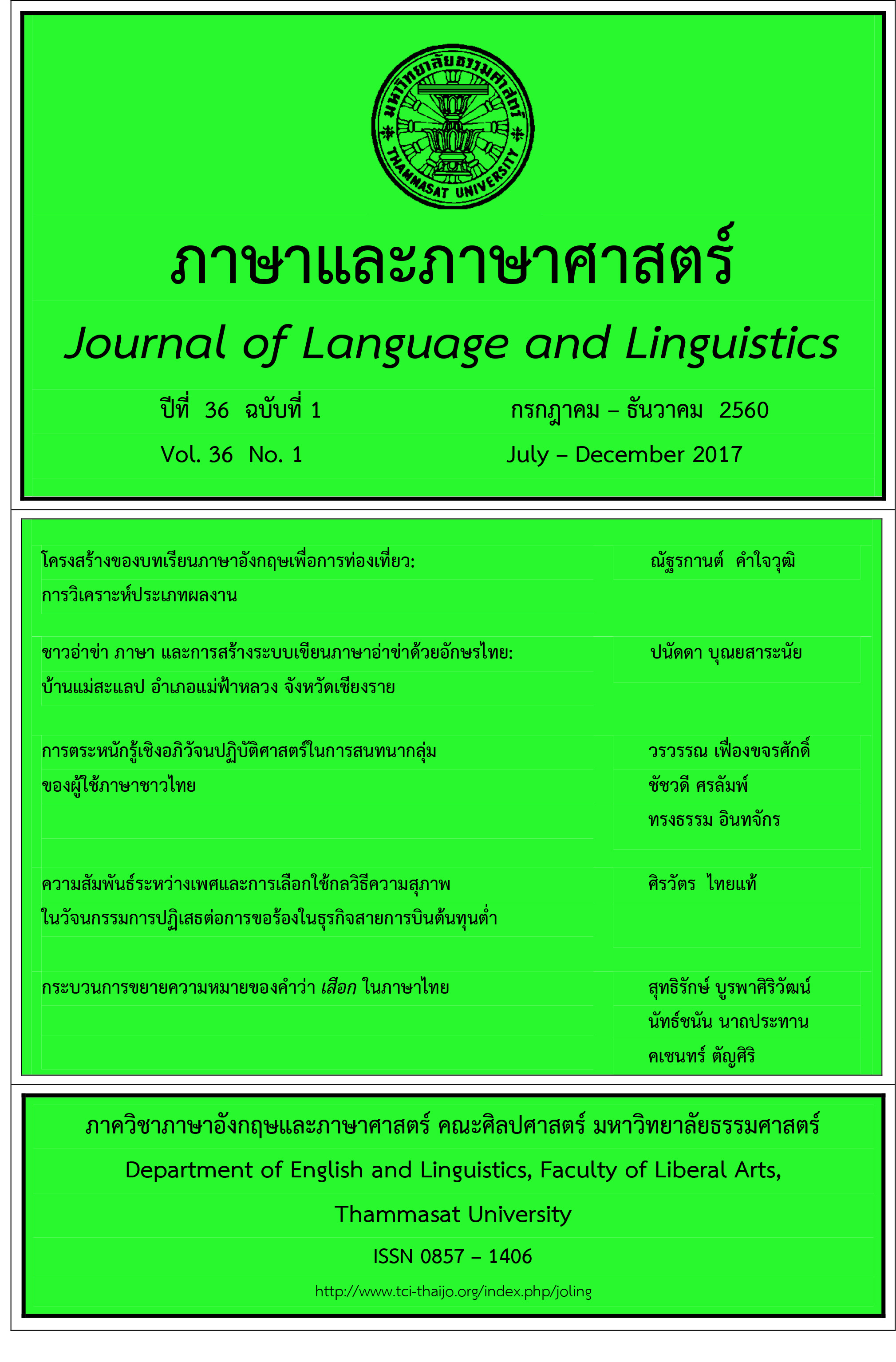The Relationship between Gender and the Selection of Linguistic Politeness Strategies of Refusal to the Request Speech Act in Low-Cost Airline Business
Main Article Content
Abstract
Gender is a social factor which does not only differentiate human from their physical differences but also differentiates their: temper, feelings, beliefs and values. These differences reflect a different style of communication.
This article aims to study the relationship between gender and politeness strategies employed to refuse passengers’ requests by Passenger Service Agents in the low-cost airline business. The data was collected from Discourse Completion Test (DCT) by investigating Passenger Service Agents divided into 2 groups: male and female informants. The data was analyzed by employing Robin Lakoff’s (1973, 1989), Geoffrey Leech’s (1983), and Brown and Levinson’s (1978, 1987) politeness approaches as a framework for politeness strategy categorization.
The results of the study reveal that male informants employed more refusal expressions than female informants. By reducing their refusal of face threatening acts, both male and female informants employed various kinds of politeness strategies to make their conversation partners satisfied. Male informants employed 16 while female employed 17 politeness strategies. More specifically, conversational partner’s gender was analyzed by focusing on whether the conversational partner’s gender affects the politeness strategies selected or not. The results show that politeness strategies selected varied into refusals based on gender.
Article Details
บทความทุกบทความเป็นลิขสิทธิ์ของภาษาและภาษาศาสตร์
References
53-82). กรุงเทพฯ: ส านักพิมพ์แห่งจุฬาลงกรณ์มหาวิทยาลัย.
ดียู ศรีนราวัฒน์. (2542). วิธีสื่อสารด้วยการพูดอ้อมของคนไทย, วารสารภาษาและภาษาศาสตร์, 17(2), 26-39.
ทัศนีย์ เมฆถาวรวัฒนา. (2554). ปัจจัยที่ใช้ในการตัดสิน “ความสุภาพ” ในการสนทนาของเพศชายและเพศหญิงในกลุ่มตัวอย่างระดับอุดมศึกษาของไทย, พัฒนบริหารศาสตร์, 51(3), 141-166.
พิมพ์พาภรณ์ บุญประเสริฐ. (2551). ค้าที่แสดงความสุภาพในภาษาไทย: นัยเรื่องเพศสภาพและการแสดงอ้านาจ, วารสารภาษาไทยและวัฒนธรรมไทย, 2(1), 106-116.
Brown, P. and Levinson, S. (1978). Universals in language usage: Politeness phenomena, In Goody, E. (Eds.). Questions and politeness. Cambridge: Cambridge
University Press.
_______. (1987). Politeness: Some universals in language usage. Cambridge: Cambridge University Press.
Goffman, E. (1967). Interaction Ritual. New York: Doubleday Anchor.
Holmes, J and Meyerhoff, M. (2003). The handbook of language and gender. Oxford: Blackwell Publishing.
Lakoff, R. (1973). The logic of politeness: Or minding your P’s and Q’s, in Corum, C.,Smith-Stark, T. C., and Weiser, A. (Eds.). Papers from the 9th Regional Meeting of
the Chicago Linguistic Society. Chicago, 292-305.
_______. (1989). The limits of Politeness: therapeutic and courtroom discourse, Multilingual, 8 (2-3): 101-129.
Leech, G. (1983). Principles of Pragmatics. London: Longman.
Leo, C. (2013). When enough is enough! Alcohol servers’ refusal styles and key antecedents. International Journal of Hospitality Management, 35, 10-18.
Morkus, N. (2014). Refusals in Egyptian Arabic and American English. Journal of Pragmatics, 70, 86-107.
Yusefi, K., Gowhary, H., Azizifar, A., & Esmaeili, Z. (2015). A pragmatic analysis of thanking strategies among Kurdish speakers of Ilam based on gender and age.
Procedia-Social and Behavioral Sciences, 199, 211-217.


